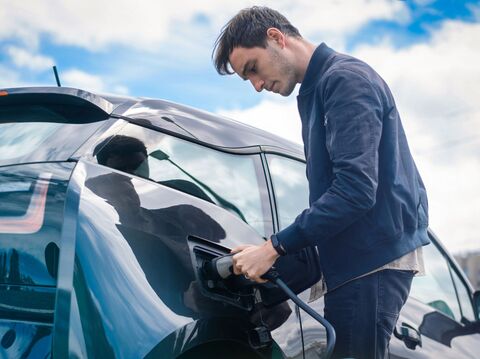The Future of Mobility In India Is Here And It Is Electric !

The move to electric mobility by nations worldwide to reduce carbon emissions has sparked the Electric Vehicle (EV) revolution. This transformation also applies to India which is determined to take the lead in the fight against climate change.
India is now dealing with several environmental problems, including declining air quality in the city which is one of the reasons why electric vehicles are the future of mobility.
Road transportation accounts for about 123 million tonnes of the total 142 million tonnes of carbon dioxide emissions produced annually by the transportation sector.
To support its objective of creating a sustainable transportation network and reducing carbon emissions, the Government of India plans to replace 30 percent of its car fleet with electric mobility by 2030.
Electric Vehicle : The New Normal
An electric vehicle runs solely on electricity. Unlike other conventional vehicles, this one does not have an internal combustion engine. Instead, an electric motor drives the wheels.
These vehicles have become increasingly popular and are regarded as a promising future transportation solution. If you are asking yourself ‘why is electric vehicle the future?’ then, Tesla is the simplest answer.
Factors Promoting the Use of Electric Vehicles
Piyush Goyal, a former minister of power, stated earlier this year that he hoped to see the country without a single petrol or diesel car sold by the year 2030.
EV sales are still low globally, but precedents from other nations show that four push and pull variables could affect how quickly EVs are adopted in India. These are some factors that could influence the future of electric vehicles in India.
Regulations and Rewards
Numerous nations have encouraged e-mobility through a variety of incentives, but EV uptake was not sparked by these measures alone.
Indirectly, a supportive ecosystem that also enacts stringent rules on carbon emissions and laws driven by strategic aim (e.g., minimizing the current account deficit and lessening geographic dependence on crude oil) causes EV adoption to increase.
Technology
Expensive batteries have an impact on production and sales because they make up a significant portion of the overall cost of an electric vehicle in India.
EVs can become more affordable and appealing to potential customers thanks to improved technology that can lower battery prices, boost efficiency, and extend driving range.
Infrastructure
It's crucial to have quick and inexpensive access to charging infrastructure, which includes both conventional AC and rapid DC charging.
Customer Demand
To encourage consumers to buy an electric vehicle, it will be essential to create a pull among them by developing a reasonable cost offer.
As consumer demand for electric vehicles gradually rises, so does the market for investments in them. Therefore, seek out Growth Jockey's expert assistance if you want to take advantage of this market opportunity to invest.
Initiatives Taken by the Indian Government to Accelerate the Use of Electric Vehicles
To encourage the use of EVs, the Department of Heavy Industry created the FAME India Scheme (Faster Adoption and Manufacturing of (Hybrid and) Electric Vehicles in India) in 2015.
To promote electric vehicles in India, the government has started the following initiatives:
-
Following the new GST system, the GST rate for electric vehicles is cut from 12% to 5% as opposed to the 28% GST rate with a maximum of 22% for conventional automobiles.
-
To encourage the use of environmentally friendly cars throughout the nation, the government has suggested exempting battery-operated/electric vehicles from registration fees.
-
Additionally, the government has waived the permit requirements for cars that run on methanol and ethanol as well as battery-operated transport vehicles.
-
The Ministry of Road Transport and Highways has also allowed people aged 16 to 18 to obtain driving licenses to operate e-scooters.
The Challenges of Adopting Electric Vehicles in India
Well, it's encouraging to learn that the electric vehicle market is on the rise. However, before companies and the industry can fully capitalize on the market, some hurdles must be overcome.
Let's take a look at some of these challenges to understand whether is India ready for electric vehicles.
Rang Anxiety
This is one of the most difficult issues as it is a common concern before purchasing an electric vehicle. Customers who buy electric vehicles are frequently concerned about the vehicle's ability to reach their location before the battery fails.
The lack of charging infrastructure is also a cause of concern. In rural or sparsely populated areas, charging infrastructure is severely deficient.
Consumer Safeguards
While the technology is still relatively young and is gaining acceptance, the repair and maintenance system is still very small in comparison to ICE vehicles. One of the main causes of this challenge is a scarcity of people skilled in EV maintenance.
High Initial Cost
Compared to ICE vehicles, electric vehicles are initially very expensive. The Tata Nexon, for example, starts at 7.19 lakh, whereas the Tata Nexon EV starts at 13.99 lahks.
Battery Technology is Scarce
In India, the number of OEMs producing batteries from raw resources is very small.
When combined with the country's lack of certain minerals (cobalt and lithium) required to produce a battery, it harms the country's ambition to become an EV hub. Currently, the country is heavily reliant on Chinese and Korean producers.
Lack of Products
When purchasing an Ev, a consumer has significantly fewer options than when purchasing an ICE. For example, there are several options for a superbike (ICE), but very few (if any) mass-produced EVs.
Why is Investing in India's EV Market a Good Idea?
Due to its significance and future growth, the EV industry is already attracting investments. It had investments of about $6 billion in 2021, and by 2030, that amount is anticipated to rise to $20 billion.
The Indian government and the automotive industry have common objectives, which are encapsulated in the Automotive Mission Plan (AMP) 2016–26.
The industry is predicted by the AMP 2016-26 to contribute over 12% of the country's GDP, of which 7.1% has already been reached.
It hopes to make up 40% or more of the industrial sector by the end of 2026. If these goals are reached, both India's automotive industry and the country would transform.
The country's internal lithium-ion battery production ambitions may cut the price of EVs, lowering dependence and disturbing import taxes. This is another crucial element. Consequently, India will soon have a sizable market.
The future of the car industry is thought to lie with India's electric vehicles. EVs are expected to overtake gasoline-powered vehicles as the industry's mainstay in the coming years due to the current climate change and concerns about it.
This industry, which increased from $181 million to $1.7 billion, has attracted a lot of private equity and venture capitalist investors.
There are several mutual funds, such as Mirae Asset Global Electric and Autonomous Vehicles exchange-traded fund (ETFs), that invest in projects like lithium and battery technologies.
If you're interested in making an investment in the market for electric vehicles, get in touch with Growth Jockey. We provide specialized services that are most suited to your individual requirements to assist you in getting the greatest outcomes.
Conclusion
To summarise, electric vehicles are the future of personal transportation in India.
The growing market for renewable and sustainable energy sources, the government's drive toward e-mobility, and recent technological advancements have made EVs more affordable and accessible to the general public.
The transition to EVs will benefit not only the environment but also the country's growth and development.
Since it is clear that the market for electric vehicles appears to be very promising in terms of investment, it may be a good idea for you to begin investing in this field.
Contact us for personalized services that will help you realize all of your business growth goals with the best advice.








